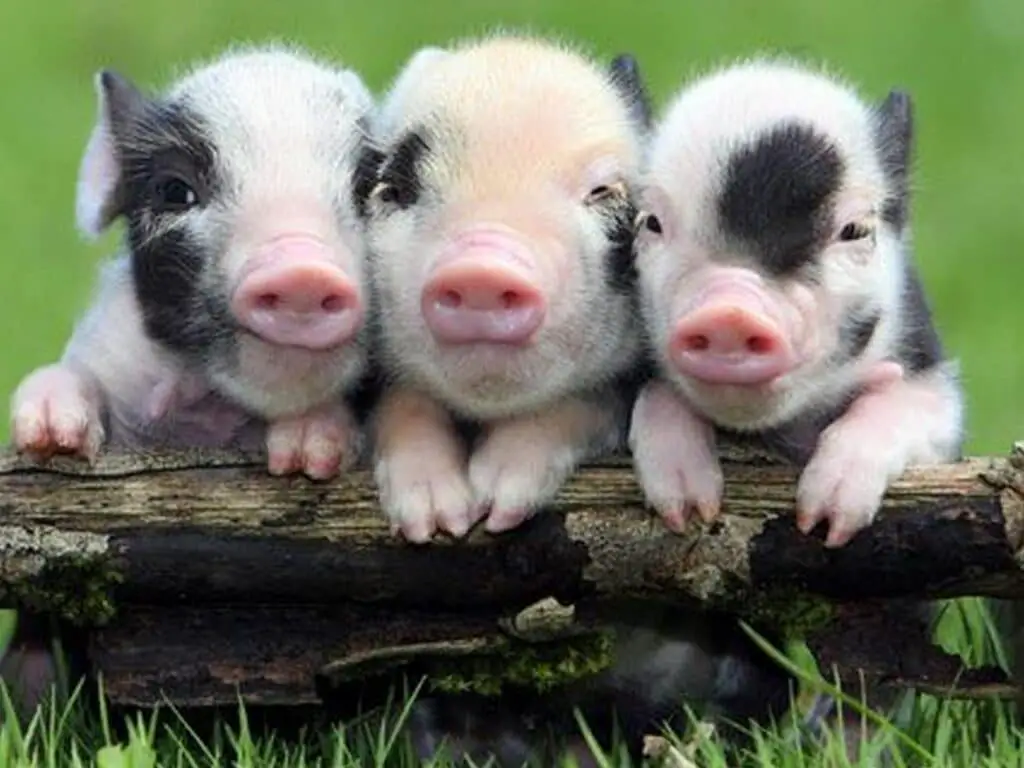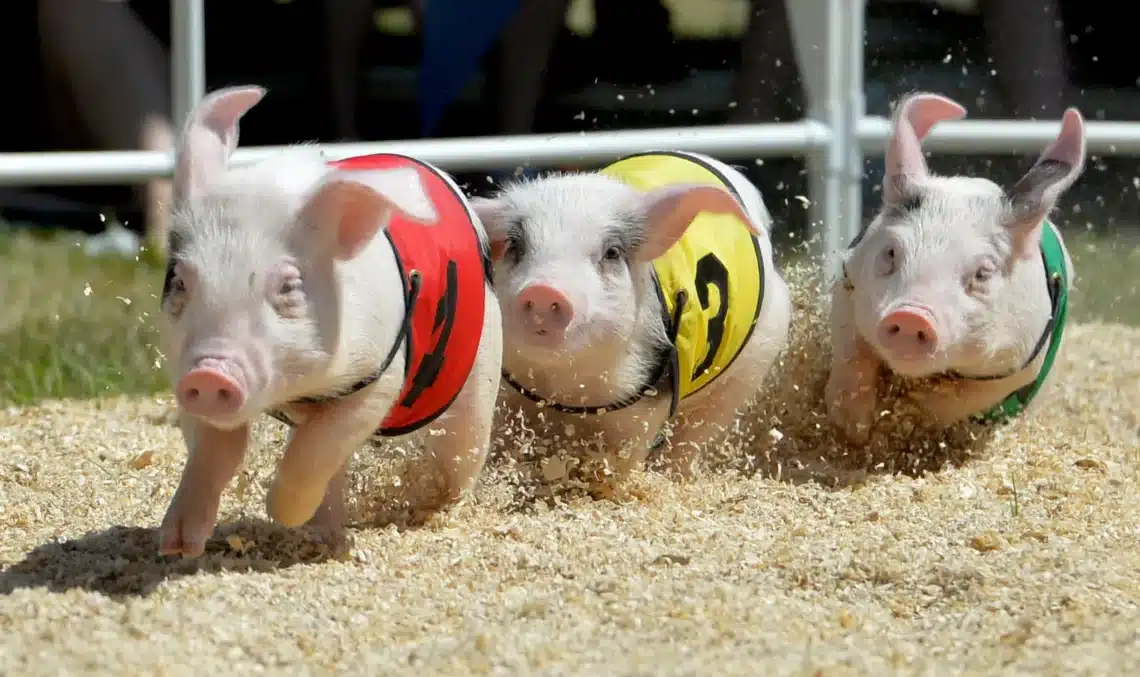Introduction
How Smart Pigs Are: Pigs, often underestimated in terms of intelligence, are remarkably clever and adaptive creatures. These porcine wonders exhibit a level of intelligence that may surprise many, showcasing an array of problem-solving abilities, social skills, and emotional depth that rivals some of the most revered animals in the animal kingdom. From their aptitude for learning new tasks to their sophisticated social structures, pigs have earned a reputation for being far smarter than their barnyard image might suggest.
One of the most compelling aspects of pig intelligence is their remarkable problem-solving skills. Pigs have an innate ability to navigate complex situations, often figuring out how to access food, escape enclosures, or manipulate objects to their advantage. Their inquisitive nature drives them to explore their surroundings and come up with creative solutions to challenges they encounter.
Beyond their individual problem-solving abilities, pigs also exhibit impressive social intelligence. They form tight-knit bonds within their social groups, demonstrating empathy, cooperation, and communication skills. Pigs are known to engage in complex social interactions, such as establishing hierarchies, resolving conflicts, and even showing signs of reciprocity, where they remember and repay favors. This intricate social intelligence not only helps them thrive within their own groups but also makes them highly adaptable to various human environments.

How are pigs intelligent?
Pigs are smart animals that can understand and respond to how others see things. This is called perspective-taking. They can use visual cues to figure out what others know or want. For example, when searching for food together, pigs can learn from each other to find food faster.
Long-Term Memory:
Pigs possess an impressive long-term memory that allows them to retain information and experiences for extended periods. This capability is particularly evident in their ability to remember complex environments, recognize individual humans and animals, and recall past experiences.In farming and animal husbandry, this aspect of pig intelligence has practical implications. Pigs can remember the layout of their living spaces, the locations of food sources, and the routines of their caregivers. This memory helps them navigate their surroundings effectively and adapt to changes in their environment.
Tool Use and Manipulation:
The ability to use tools is often considered a hallmark of higher intelligence among animals. While pigs may not craft intricate tools like some primates, they do exhibit tool use and manipulation to solve problems and access resources.In the wild, pigs have been observed using their snouts to dig for food, creating tools out of natural materials like sticks and leaves to extract insects and grubs from the ground. This behavior highlights their resourcefulness and adaptability in foraging for sustenance.
Communication Skills:
Pigs communicate with each other through a variety of vocalizations, body language, and scent marking. Their communication skills are remarkably sophisticated, reflecting their intelligence and social nature.
Pigs can convey a wide range of emotions and intentions through vocalizations. They use different sounds to express excitement, contentment, distress, and more. Studies have shown that pigs can differentiate between various vocal cues, allowing them to respond appropriately to the emotions of their herdmates.
How smart is a pigs brain?
However, most researchers agree that a pig’s cognitive abilities—emotional depth, memory, spatial learning, self awareness, object discrimination, et cetera—are comparable to that of a young child as old as three.
Pigs are often underestimated when it comes to their intelligence, but their brains are surprisingly complex and capable. While they may not match the cognitive abilities of some highly intelligent animals like dolphins or chimpanzees, pigs exhibit remarkable intelligence in their own right. Understanding the intricacies of a pig’s brain can shed light on their cognitive abilities and the importance of treating them with the respect and care they deserve.
Pigs belong to the family Suidae and are known for their relatively large brains compared to other domesticated animals. In terms of brain size relative to body size, pigs’ brains are quite impressive. This is a strong indicator of their potential intelligence. The average pig’s brain weighs approximately 180 grams, which is relatively small compared to the human brain but substantial compared to many other farm animals. This size allows for a complex neural network, enabling pigs to display a range of cognitive behaviors.
One key aspect of a pig’s intelligence is their ability to learn and adapt to new environments and situations. Pigs are highly curious animals, and they possess strong problem-solving skills. Research has shown that they can quickly learn to navigate mazes, solve puzzles, and even operate simple machinery, demonstrating their capacity for critical thinking and memory retention. Their ability to adapt to different environments is essential for their survival and is a testament to their intelligence.
Are pigs smarter than cow?
So there you have it. The smartest farm animals, in order, from top to bottom, goes like this: pig, horse, cow, chicken and sheep. That’s my line up, and I’m sticking to it.
Cognitive Abilities:
When it comes to cognitive abilities, pigs often outshine cows. Pigs are known for their remarkable problem-solving skills and adaptability. Studies have shown that pigs can quickly learn to navigate mazes, recognize and manipulate objects, and even understand simple commands. Their capacity to adapt to
various environmental conditions and learn from their surroundings is a testament to their cognitive prowess.
Cows, on the other hand, are not as renowned for their problem-solving abilities. While they possess a degree of intelligence that enables them to learn and remember basic tasks and routines, their cognitive capabilities are generally considered to be more limited compared to pigs. Cows are primarily focused on grazing and maintaining their social hierarchies within the herd, which doesn’t require the same level of cognitive complexity as the tasks that pigs often encounter.
Social Interactions:
Pigs and cows also exhibit distinct differences in their social behaviors, which can be indicative of their intelligence. Pigs are highly social animals with complex social structures. They form strong bonds with other pigs, engage in cooperative behaviors, and even demonstrate empathy towards one another. These social interactions suggest a level of emotional intelligence in pigs, which is often considered a component of overall intelligence.
Cows, while also social animals, have a different social structure. Their herds are typically less hierarchical than those of pigs, and their social behaviors are more centered around maintaining group cohesion while grazing. While cows do exhibit social bonds within their herd, their social interactions are generally simpler and less emotionally intricate compared to pigs.
Adaptability:
One key measure of intelligence in animals is their adaptability to changing environments and circumstances. Pigs excel in this regard. Their adaptability is evident in their ability to thrive in a variety of environments, from dense forests to open pastures. Pigs can also adapt to different diets, making them resourceful foragers. Their flexibility in adjusting to new conditions is a testament to their intelligence.
Cows, while adaptable in their own right, are more specialized in their environmental requirements. They are well-suited to grazing in grassy landscapes but may struggle in environments with limited food sources or extreme conditions. This specialization may suggest a somewhat lower level of adaptability compared to pigs.
Is pig smarter than human?
How Intelligent Are Pigs in Human Years? Pigs are able to outperform three-year-old human children on cognition tests. This age was determined based upon the shared abilities of pigs and children of the age.
Cognitive Abilities:
Cognitive abilities encompass a wide range of mental processes, including problem-solving, memory, learning, and reasoning. While humans undoubtedly excel in these areas, pigs exhibit surprising cognitive prowess of their own. Pigs are known for their excellent memory and ability to navigate complex environments. They can remember the locations of food sources, recognize their fellow pigs, and even understand basic commands.
Emotional Intelligence:
Emotional intelligence refers to the ability to recognize, understand, and manage one’s own emotions and the emotions of others. In this regard, pigs display remarkable emotional intelligence. Pigs are social animals that form deep emotional bonds with their fellow pigs. They are capable of empathy, often comforting each other in times of distress. Furthermore, research has shown that pigs can experience a wide range of emotions, including happiness, fear, and even a form of grief when separated from their social groups.
Adaptability:
Adaptability is another critical aspect of intelligence, as it reflects an organism’s ability to adjust to changing circumstances and environments. Pigs, as highly adaptable creatures, excel in this aspect. They can thrive in a variety of habitats, from forests to farms, and have successfully adapted to diverse ecological niches.Humans, however, are unparalleled in their adaptability. Our intelligence enables us to not only adapt to various environments but also to manipulate and transform them to suit our needs. The development of technology, culture, and civilization is a testament to human adaptability on a grand scale. While pigs are adaptable in their own right, they cannot match the breadth and depth of human adaptability.
Do pigs understand human language?
Potbelly pigs, chimpanzees, and elephants all understand some human language. Scientists believe we may even be able to talk to dolphins one day! Some animals are very good at communication. They understand humans better than other animals do.
Pig Intelligence:
Pigs are often underestimated when it comes to their intelligence. They are known for their problem-solving skills, memory, and ability to adapt to new environments. In fact, research has shown that pigs have cognitive abilities comparable to dogs and even some primates. Their intelligence is evident in various behaviors, such as their capacity to learn tricks, navigate mazes, and interact with their surroundings.
One of the most famous examples of pig intelligence is the “Pig Puzzle” experiment conducted by Dr. Candace Croney at Purdue University. In this study, pigs were given a complex puzzle to solve, which required them to move and manipulate objects to access a food reward.
Communication Abilities:
Pigs are not only intelligent but also highly social animals. They communicate with each other using a range of vocalizations, body language, and even scent signals. These communication methods are essential for maintaining social hierarchies within pig groups and for signaling distress or excitement.
Pigs are known to produce various vocalizations, including grunts, squeals, and whines, to convey their emotions and needs. For instance, mother pigs communicate with their piglets through distinct vocal cues, allowing them to locate and nurse their young. Additionally, pigs use body language, such as ear position and tail movement, to express their feelings and intentions.
The Potential for Language Comprehension:
When we ask if pigs understand human language, we’re often referring to whether they can comprehend language as we do. While pigs may not grasp the nuances of human speech or engage in complex conversations, some studies suggest that they can learn and respond to simple commands and words.
Researchers have conducted experiments where pigs were trained to associate specific verbal cues with actions or objects. For instance, a pig might be taught to respond to the word “sit” by sitting down. While this demonstrates a form of language comprehension, it’s important to note that pigs are responding to the sound and context of the word rather than understanding its meaning in the same way humans do.
Are pigs loyal?
Pigs are also very loyal to each other as well as their human companions. Many instances of pigs saving the lives of humans, and protecting and fighting for other pigs in their social group, have been documented.
Pigs are often perceived as farm animals with little to offer in terms of loyalty, but upon closer examination, their behavior reveals a surprising level of loyalty and social bonds. While they may not exhibit loyalty in the same way dogs do, pigs display loyalty within their social groups and towards their caregivers. Understanding the complexity of pig behavior and their capacity for loyalty can help us appreciate these animals in a new light.
One of the key aspects of pig loyalty is their strong social bonds within their groups. Pigs are highly social animals, and they form tight-knit communities within their herds. These communities are often referred to as sounders, and they consist of closely related individuals. Within these sounders, pigs display loyalty by sticking together, foraging as a group, and protecting each other. When one pig is in distress or danger, the others will often rush to its aid, showcasing a sense of loyalty and cooperation within the group.
Pigs also demonstrate loyalty to their caregivers. When raised in a positive and nurturing environment, pigs can form strong bonds with the humans who care for them. They become familiar with their caregivers and often display affectionate behaviors, such as wagging their tails and seeking attention. This loyalty is a result of the pig’s ability to recognize and remember individuals who treat them kindly. It is not uncommon for pigs to seek comfort and security from their human caregivers, highlighting the depth of their emotional connections.
How long is a pigs memory?
Pigs have very long memories and can remember things even years later. Newborn piglets learn to run to their mothers’ voices, and mother pigs can communicate with them through her grunts whilst they suckle.
The Memory Duration in Pigs:
The duration of a pig’s memory is a subject of scientific investigation and debate, but research suggests that pigs have a memory that spans several months, if not longer. One study conducted at Purdue University found that pigs could remember simple tasks for at least six weeks. In the experiment, pigs were trained to associate a specific sound with a food reward. Even after six weeks of not hearing the sound, the pigs were able to recall the association and respond correctly when the sound was played again. This finding indicates that their memory lasts for an extended period.
The Role of Social and Environmental Factors:
A pig’s memory is influenced by various factors, including their social interactions and environmental conditions. Pigs are highly social animals and live in complex social hierarchies. Their memory plays a crucial role in remembering the relationships within their social groups. They can recognize and remember other pigs, and this memory aids in establishing and maintaining social bonds. Pigs can also remember the dominance hierarchy within their group, which helps reduce conflicts and maintain stability.
Implications for Animal Welfare:
Understanding the duration and characteristics of a pig’s memory has important implications for their welfare, especially in the context of farming and animal husbandry. Pigs raised in industrial farming systems are often subjected to stressful and unnatural conditions. Research on pig memory highlights the importance of providing them with positive experiences and minimizing negative ones. Pigs can remember stressful or traumatic events, which can have long-term effects on their behavior and well-being.
Can pigs recognize faces?
Our work has already demonstrated 97 per cent accuracy at facial recognition in pigs.
Pig Intelligence and Social Behavior:
To understand whether pigs can recognize faces, it’s essential to first appreciate the level of intelligence and social behavior exhibited by these animals. Pigs are remarkably intelligent creatures, often compared to dogs in terms of cognitive abilities. They have excellent problem-solving skills, can learn tricks, and even play simple video games. Their intelligence is closely tied to their social nature, as they live in hierarchical groups in the wild and form strong bonds with other pigs.
Research on Pig Facial Recognition:
Recent studies have provided intriguing insights into the ability of pigs to recognize faces. One notable experiment conducted at Purdue University in the United States used a touchscreen computer to test pigs’ facial recognition abilities. The pigs were shown pictures of human faces, and they were trained to touch the image of a specific person’s face on the screen to receive a reward. Over time, the pigs demonstrated an impressive ability to identify and remember the faces of different individuals, even when the faces were presented at different angles.
The Evolutionary Perspective:
The ability of pigs to recognize faces can be understood from an evolutionary perspective. Pigs are highly social animals that rely on cooperation and communication within their groups. Recognizing and remembering the faces of other group members would provide them with a significant advantage in navigating their social relationships. Furthermore, it may also serve as a defense mechanism against potential threats or predators.

Conclusion
The intelligence of pigs is a remarkable aspect of their existence that often goes underestimated and underappreciated. These animals, far from the stereotypes of mere gluttony, exhibit a range of cognitive abilities that place them among some of the most intelligent creatures on our planet. From their problem-solving skills to their capacity for learning, pigs consistently defy conventional notions about their intelligence.
Pigs’ cognitive prowess is closely intertwined with their social behavior. Their ability to navigate complex hierarchies and form strong bonds with other pigs underscores the importance of their intelligence in their natural habitat. The recognition of familiar faces within their social groups adds another layer to their cognitive abilities, emphasizing their adaptability and the sophistication of their social interactions.
Understanding how smart pigs are not only enriches our knowledge of these animals but also carries significant implications for various domains. In agriculture, it can lead to more humane and efficient farming practices, recognizing that pigs are not merely commodities but sentient beings with complex mental lives. In animal welfare, acknowledging their intelligence emphasizes the importance of providing them with proper care and environments that cater to their cognitive needs.





No Comments